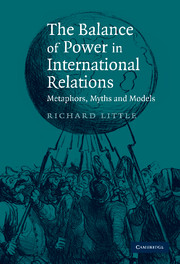Book contents
- Frontmatter
- Contents
- List of figures
- Acknowledgements
- Part I Introduction
- Part II Metaphors, myths and models
- Part III Balance of power models
- 4 Hans J. Morgenthau's Politics Among Nations
- 5 Hedley Bull's The Anarchical Society
- 6 Kenneth N. Waltz's Theory of International Politics
- 7 John J. Mearsheimer's The Tragedy of Great Power Politics
- Part IV Conclusion
- Bibliography
- Index
5 - Hedley Bull's The Anarchical Society
Published online by Cambridge University Press: 05 October 2014
- Frontmatter
- Contents
- List of figures
- Acknowledgements
- Part I Introduction
- Part II Metaphors, myths and models
- Part III Balance of power models
- 4 Hans J. Morgenthau's Politics Among Nations
- 5 Hedley Bull's The Anarchical Society
- 6 Kenneth N. Waltz's Theory of International Politics
- 7 John J. Mearsheimer's The Tragedy of Great Power Politics
- Part IV Conclusion
- Bibliography
- Index
Summary
The balance of power plays a privileged role in Bull's (2002: 112) The Anarchical Society because it helps to provide ‘the conditions in which other institutions on which international order depends are able to operate’. Bull not only identifies the balance of power as one of five key institutions that developed and sustained the European international society of states, but he also argues that it underpins the other four institutions. A closer investigation reveals, however, that the role occupied by the balance of power in The Anarchical Society is more complex and less straightforward than Bull formally acknowledges. Although he initially stipulates that the institutional structure of the European international society was underpinned by the balance of power, his analysis demonstrates that, in practice, all five institutions are mutually interdependent. In particular, his analysis demonstrates that the balance of power is to a significant extent sustained by the existence of the other institutions. Because of this mutual interdependence, the balance of power impinges on every aspect of Bull's conception of an international society and so it is intimately associated with much of the complexity in international relations that his approach highlights. But Bull's view of the balance of power is not only more complex than is apparent at first sight, it is also less straightforward. What complicates his approach to the balance of power is the distinction that he draws between an international society and an international system.
- Type
- Chapter
- Information
- The Balance of Power in International RelationsMetaphors, Myths and Models, pp. 128 - 166Publisher: Cambridge University PressPrint publication year: 2007

